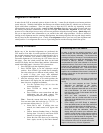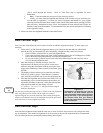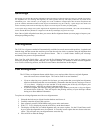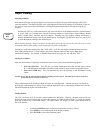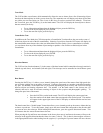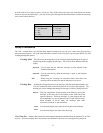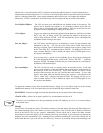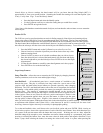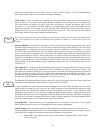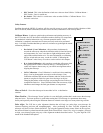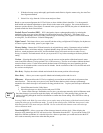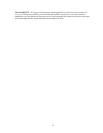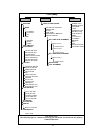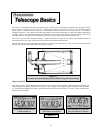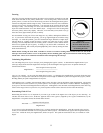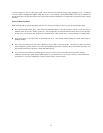
26
button, go with the higher value for positive, but use a lower value for negative. CGE will remember these
values and use them each time it is turned on until they are changed.
Filter Limits – When an alignment is complete, the CGE automatically knows which celestial objects are
above the horizon. As a result, when scrolling through the database lists (or selecting the Tour function), the
CGE hand control will display only those objects that are known to be above the horizon when you are
observing. You can customize the object database by selecting altitude limits that are appropriate for your
location and situation. For example, if you are observing from a mountainous location where the horizon is
partially obscured, you can set your minimum altitude limit to read +20º. This will make sure that the hand
control only displays objects that are higher in altitude than 20º.
If you want to explore the entire object database, set the maximum altitude limit to 90º and the minimum limit to
–90º. This will display every object in the database lists regardless of whether it is visible in the sky from your
location.
Direction Buttons –The direction a star appears to move in the eyepiece changes depending on which side of
the Meridian the telescope tube is on. This can create confusion especially when guiding on a star when doing
astrophotography. To compensate for this, the direction of the drive control keys can be changed. To reverse
the button logic of the hand control, press the MENU button and select Direction Buttons from the Utilities
menu. Use the Up/Down arrow keys (10) to select either the azimuth (right ascension) or altitude (declination)
button direction and press ENTER. Select either positive or negative for both axes and press ENTER to save.
Setting the azimuth button direction to positive will move the telescope in the same direction that the telescope
tracks (i.e. towards the west). Setting the altitude buttons to positive will move the telescope counterclockwise
along the DEC axis. Direction Buttons will only change the eyepiece rates (rate 1-6) and will not affect the slew
rates (rate 7-9).
Goto Approach - lets the user define the direction that the telescope will approach when slewing to an object.
This allows the user the ability to minimize the affects of backlash when slewing from object to object. Just
like with Direction Buttons, setting GoTo Approach to positive will make the telescope approach an object from
the same direction as tracking (west) for azimuth and counterclockwise in declination. Declination Goto
approach will only apply while the telescope tube is on one side of the Meridian. Once the tube passes over to
the other side of the Meridian, the Goto approach will need to be reversed.
To change the Goto approach direction, simply choose Goto Approach from the Scope Setup menu, select either
Altitude or Azimuth approach, choose positive or negative and press ENTER.
In order to minimize the affect of gear backlash on pointing accuracy, the settings for Button Direction should
ideally match the settings for GoTo Approach. By default, using the up and right direction buttons to center
alignment stars will automatically eliminate much of the backlash in the gears. If you change the Goto
approach of your telescope it is not necessary to change the Button Direction as well. Simply take notice of the
direction the telescope moves when completing it final goto approach. If the telescope approaches its alignment
star from the west (negative azimuth) and clockwise (negative altitude) than make sure that the buttons used to
center the alignment stars also move the telescope in the same directions.
Autoguide Rate – Allows the user to set an autoguide rate as a percentage of sidereal rate. This is helpful
when calibrating your telescope to a CCD autoguider for long exposure photography.
Mount Settings- Once the mount setting have been calibrated (see Utilities section below) the values are
stored and displayed in the hand control. It is not recommended that the calibration values be changed, however
each setting can be changed if necessary to improve the performance of the telescope.
• Cone Value – This is the cone error value set when Utilities / Calibrate Mount / DEC Switch -
Cone is carried out.
Observing
Tip!
Helpful
Hint!



